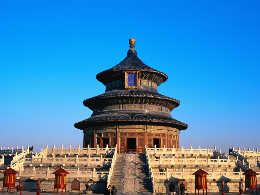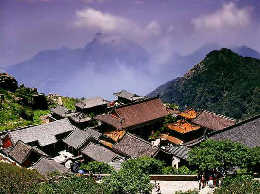Popular Chinese culture encompasses a number of non-religious belief systems. The blending of various religious deities and non-religious spirits gave rise to the Chinese people's characteristically pragmatic religious beliefs.
Popular Chinese beliefs were greatly influenced by hierarchical Confucian ideology, giving rise to the veneration of "Heaven, Earth, Rulers, Ancestors, and Masters."
(1) Heaven

Temple of Heaven,Beijing
Chinese folk beliefs are based in a large part on the worship of various aspects of Nature, particularly the heaven, earth, sun, and moon. TheTempleof Heaven is a sacred complex in Beijing where the emperor made sacrifices to heaven. Its outer wall is round, symbolizing heaven, and the inner wall is square, symbolizing earth. This embodies the ancient Chinese cosmological principle that heaven (the natural world) is round and earth (human experience and concepts of order) is square.
(2) Earth

Bixia Yuanjun Temple,Mount Tai
Veneration of Earth was expressed by offering sacrifices to mountains and rivers. Among the main centers of worship were the temples of the Five Great Mountains, including Mount Tai, and the temples of the Four Great Rivers, including theYellow Riverand the Changjiang River. After the 10th century, temples to local Earth deities also spread throughout the country.
